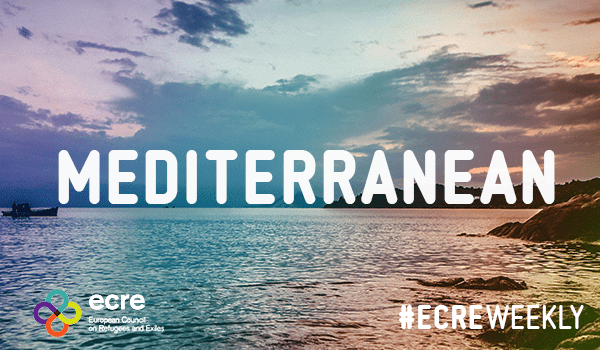About 100 people remain missing at sea following two shipwrecks off Libya and off Tunisia as bodies wash up ashore. New details about a pushback case to Libya reveal it was organised and payed for by Malta. EU Commissioner for Home Affairs visits Tunisia to reach a deal on preventing departures.
On 16 May, local fishermen encountered about 100 people in a rubber boat off the Libyan city Khoms, but their attempts to reach the so-called Libyan coastguard were in vein, the NGO hotline for people in distress Alarm Phone reports. A relative later informed the NGO that half of the boat had deflated and 47 people fell into the water. While the so-called Libyan coast guard remained unreachable, fishermen rescued 62 people but dozens remain missing at sea. The same day, another tragic incident occurred off the southern coast of Tunisia where a shipwreck claimed the lives of more than 50 people. According to the Tunisian authorities, 33 survivors who were clinging to an oil platform were rescued. Following several tragedies over the latest period, another 10 bodies washed up ashore in western Libya on Tuesday.
More than 400 survivors, including 150 children, rescued in six operations by the Sea-Eye 4 crew were about to disembark in Pozzallo, Sicily on 21 May. At the time a safe port for disembarkation was assigned, the vessel was close to Palermo and had waited for more than 48 hours for a reaction by European states. Another two days of sailing were required to reach Pozzallo. In the latest chapter of an ongoing legal saga over disembarkation, an Italian judge on 14 May dismissed the case against former Italian Minister of the Interior Matteo Salvini over his refusal to let survivors on a coast guard vessel disembark in 2019. The judge stated that no crime had been committed. The decision contradicts a recent decision in a similar case that ordered Salvini to stand trial in September. Meanwhile, a court in Sicily has dropped the case against the German captain and civil rescuer Carola Rackete over her decision to take survivors on board the Sea Watch 3 to safety despite opposition from the Italian authorities. According to Rackete’s lawyer, the court “recognised the need to save human lives”.
On 19 May, several witnesses testified in a case of 52 people suing Malta over their pushback to Libya in April 2020 by the fishing vessel Dar Es Salaam 1. Carmelo Grech, owner of the Libyan-registered vessel testified that when the vessel was anchored in Valetta’s port he was approached by an Armed Forces of Malta (AFM) representative who provided the coordinates of a distress case. The NGO hotline for people in distress Alarm Phone had alerted Maltese authorities to the situation taking place within the Maltese SAR zone. When the Dar Es Salaam 1 crew encountered the dinghy, five people had already died on board and the crew was instructed by AFM to bring aboard the survivors and deceased, to sail towards Tripoli, and to hand the rescued people over to a Libyan patrol boat. “We were asked to do this by the AFM around 3 or 4 times,” Grech elaborated. “We weren’t paid charter fees. AFM paid for fuel.” A separate ship carried food and water to Libya on behalf of AFM. On 18 May 2021, Alarm Phone received a distress call from a wooden boat in Maltese SAR zone with 88 people “in danger of capsizing at any moment”. Malta did not fulfil its duty to rescue and Alarm Phone later learned that the 88 people were intercepted by the so-called Libyan coast guard. The fate of another 95 people who were nearby in Maltese SAR zone remains unclear. The same day, another 25 people, including two children, were returned to Libya. Alarm Phone reports that “they were extremely afraid of returning to violence & exploitation” and that the so-called Libyan coast guard delayed the rescue of the leaking boat.
Recent investigations by journalist have revealed far reaching complicity of the EU Border and Coast Guard Agency Frontex in interceptions and returns to Libya. Further, the EU continues to support the so-called Libyan coast guard through training and equipment despite the well-documented human rights violations perpetrated by it. The border management programmes in Libya under the EU Emergency Trust Fund for Africa (EUTF), that include the strengthening of the so-called Libyan coast guard, amount to €57.2 million. According to the Libyan office of the International Organization for Migration (IOM), 8,170 people have been intercepted and returned by the so-called Libyan coast guard between the beginning of the year and 15 May. In the past week, more people were intercepted and returned to Libya where they are not safe and face arbitrary detention and abuse.
On 20 and 21 May, EU Commissioner for Home Affairs Ylva Johansson is visiting Tunisia together with the Italian Minister of the Interior Luciana Lamorgese in hope to reach a deal with Tunisia to provide economic support in exchange for Tunisia committing to reducing departures from Tunisian shores. The Commissioner also told media that she was open to talks with Libyan Prime Minister Abdulhamid Dbeibah over a new migration accord.
On 18 May, the Recent deaths in the Mediterranean and search and rescue at sea were on the European Parliament’s plenary sessions agenda with a speech by Commissioner Johansson.
For further information:
- ECRE, Med: Calls for Solidarity with Italy while Endless Cycle of Death at Sea Continues, May 2021
- ECRE, Med: Investigations Reveal Frontex’ Complicity in Interceptions and Returns to Horrors in Libya, April 2021
- ECRE, Search and Rescue: Italy and Libya Reaffirm Bilateral Relations as Transcripts of Controversial Italian/Libyan Communication Emerge, Crack-down on Civil Rescue Fleet and Deaths at Sea Continue, April 2021
Photo: ECRE
This article appeared in the ECRE Weekly Bulletin. You can subscribe to the Weekly Bulletin here.

